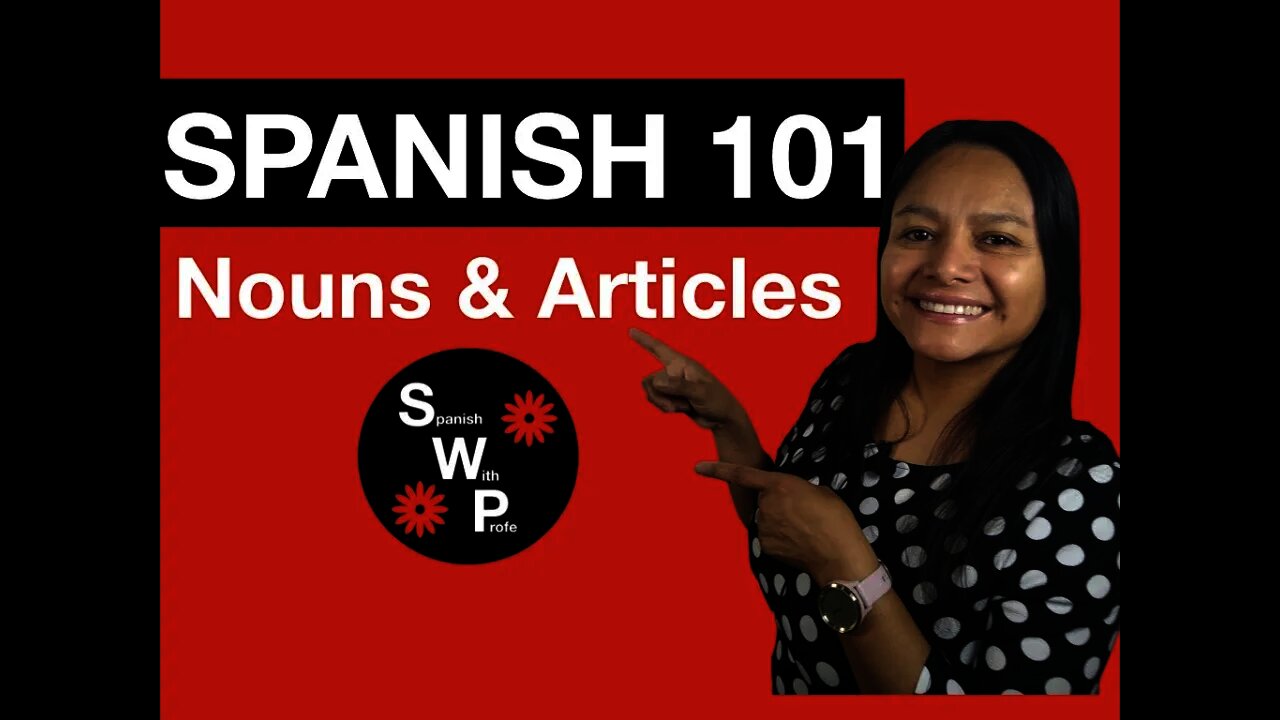Premium Only Content

Spanish 101 - Learn Nouns and Articles in Spanish for Beginners - Spanish With Profe
In this video we will learn Nouns and Articles in Spanish.
In Spanish just like in English nouns can either be singular or plural. However, in Spanish nouns have a gender: masculine, feminine, and some of them can be neutral.
Most nouns ending in "o" will be masculine; while most nouns ending in "a" will be feminine.
There will be other nouns that will be neutral such as: the ending -ista, the words joven, estudiante. With neutral nouns the gender is identify by the article they use such as: masculine- un, unos (indefinite: a, an, some) and or feminine-una, unas (indefinite: a, an, some); or the definite articles: masculine- el, los (the); and feminine - la, las (the)
In Spanish if the noun is singular you must use a singular article.
When talking about nouns it is a good idea to keep the following in mind: Nouns in Spanish agree in both number (s/pl) and in gender (m/f).
Number whether it is singular or plural; and gender whether you are referring to a masculine noun or a feminine noun.
In Spanish it is easy to make a noun plural. In English making a noun plural can be a bit hard. (E.g. church+es=churches; book+s= books, apple+s=apples) In Spanish the rule is the following:
Any noun that ends in a vowel (a, e, i, o, u) you need to add "s" to make it plural. E.g. casa + s= casas
Any noun ending in a consonant (d, n, l, etc.) you need to add "es" to make it plural. E.g. ciudad + es= ciudades
Vocabulary words in this video:
Masculine: Feminine:
el hombre la mujer
el chico la chica
el pasajero la pasajera
el conductor la conductora
el profesor la profesora
el cuaderno la cosa
el diario la escuela
el diccionario la maleta
el número la palabra
el vídeo la lección
el problema la conversación
el programa la nacionalidad
el autobús la mochila (not in the video)
el país la comunidad
In Spanish most endings in "o" ; "ma" ; and "s" will be masculine
and most endings in "a"'; "ción"; and "dad" will be feminine
The following are a few examples of exceptions to the rule:
el mapa (m)
el día (m)
la mano (f)
With neutral ones: focus on the articles to determine their gender
el - la turista
el - la joven
el - la estudiante
el - la artista
Some Ways Below To Help Out The Channel Listed Below
► DONATIONS via PayPal (To help support the channel you can donate via PayPal): https://paypal.me/SpanishWithProfe?locale.x=en_US
► ROBINHOOD (Get 1 Stock When You Sign Up. Easy to use app for investing and you get a free stock.): https://join.robinhood.com/grants1730
► WEBULL (Get 2 Stock When You Sign Up):https://www.webull.com/activity/get-free-stocks?inviteCode=uYiu2aNdG46N&source=invite_gw&inviteSource=wb_oversea
► CRYPTO.COM Use my referral link https://crypto.com/app/e3p3g4rc9m to sign up for Crypto.com and we both get $25 USD :
-
 26:54
26:54
Spanish With Profe
1 year ago $0.08 earned25 Advanced phrases that can help you take your Spanish language skills to a higher level Part 2/3
5212 -
 LIVE
LIVE
MyronGainesX
19 hours agoFormer Fed Explains Serial Killer Israel Keyes, Yahweh ben Yaweh, And The El Rukn Gang!
17,001 watching -
 LIVE
LIVE
Due Dissidence
8 hours agoGaza STARVATION Hits Tipping Point, Flotilla CAPTURED, Bongino BREAKS SILENCE, Maxwell MEETS DOJ,
1,685 watching -
 LIVE
LIVE
GritsGG
9 hours agoWin Streaking! Most Wins 3180+! 🔥
1,050 watching -
 LIVE
LIVE
This is the Ray Gaming
1 hour agoSunday Night LIVE | Rumble Premium Streamer
128 watching -
 2:42:31
2:42:31
Barry Cunningham
6 hours agoPRESIDENT TRUMP IS SAVING AMERICA ONE DEAL AT A TIME! UNBELIEVABLE!
54.1K32 -
 LIVE
LIVE
EricJohnPizzaArtist
5 days agoAwesome Sauce PIZZA ART LIVE Ep. #56: Bret “The Hitman” Hart Tribute with SoundBoardLord!
252 watching -
 1:38:08
1:38:08
HELMETFIRE
2 hours ago🟢GAMING WITH FIRE EP4🟢RUMBLE TAKEOVER!🟢
3.52K -
 LIVE
LIVE
iCheapshot
3 hours agoCheap Plays Warzone Again? What!?
78 watching -
 2:30:14
2:30:14
PandaSub2000
5 hours agoCHAOS & FURY | Episode 27: Attack Of The Cranks (Edited Replay)
4.78K